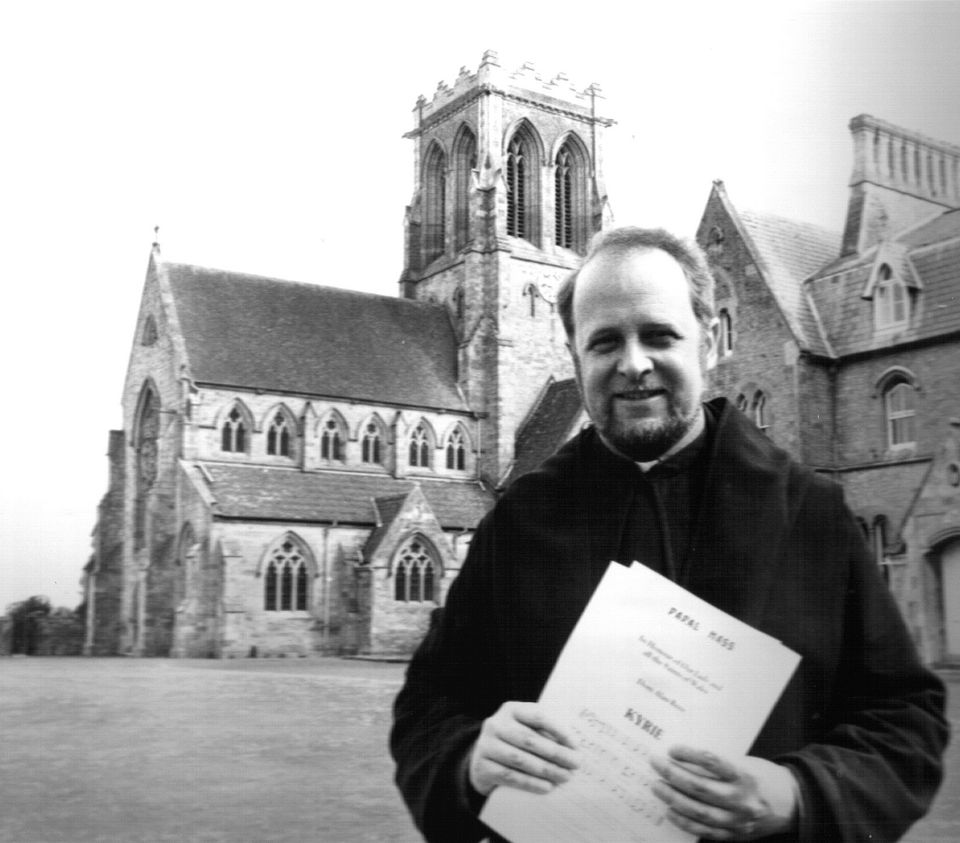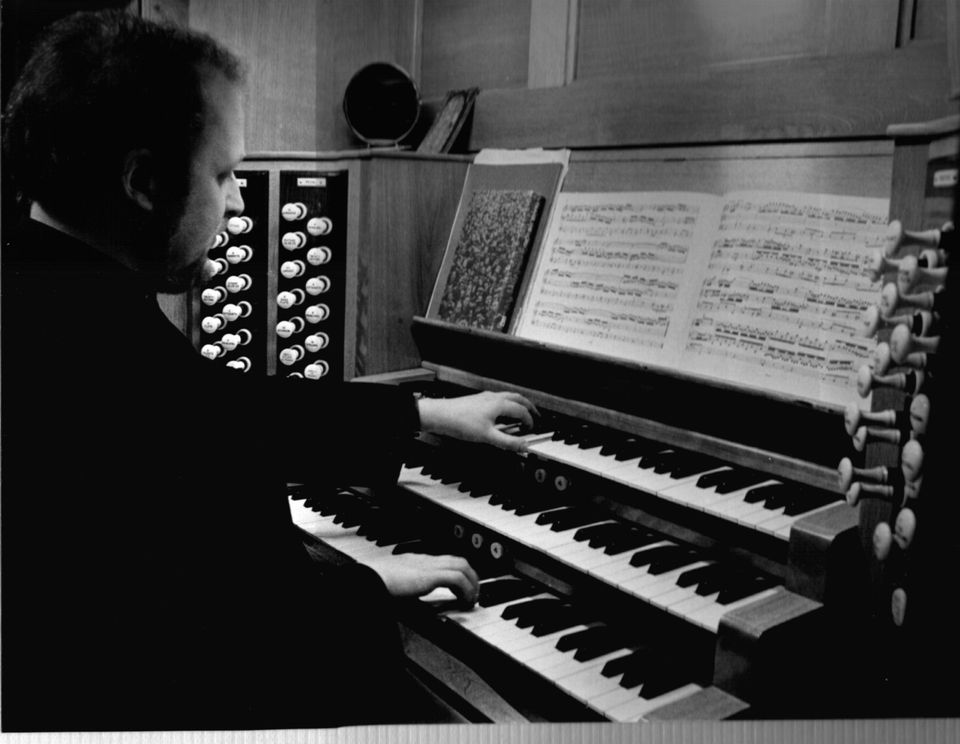Abbot Alan Rees: Obituaries from The Times and Daily Telegraph
Father Alan Rees, composer, Abbot of Belmont, 1986-93, was born on February 1, 1941. He died after a fall on October 2, 2005, aged 64.
The Obituary from 'The Times'
Father Alan Rees February 1, 1941 - October 2, 2005
Abbot of the Benedictine monastery of Belmont whose settings of the Mass are
played and sung in churches worldwide
A WELSH organist, monk and musician, Father Alan Rees was a gifted composer who
enriched tremendously the music of the Roman Catholic Church when its liturgy
passed from Latin into the vernacular after Vatican II.
Sacred music, said Rees, should be ““easy to sing, generally tuneful, easy to learn”” and above all prayerful, inducing the singer to focus on the spiritual message of the text rather than worrying about the notes.
Inspired by the Gregorian chant, which he sang daily as a monk at Belmont Abbey, Herefordshire, Rees composed many modern settings for the Mass, including the office of Vespers, for use in the average parish. A magnificent organist, he also had a gift as a wordsmith, setting words to music after meditating deeply on their spiritual meaning.
Rees’’s Mass settings are now used in Anglican and Catholic churches worldwide. Particularly popular are his Belmont Psalm tones and responses, chant and organ music. His greatest public accolade was being invited to compose a special Mass for Pope John Paul II’’s visit to St David’’s Cathedral, Cardiff, in 1982; before entering Belmont Benedictine monastery Rees had been the cathedral’’s choirmaster.
Alan Rees was born in Morriston, near Swansea, in 1941, the only son of John and Hilda Rees. His love of religion and music began at an early age with a visit to a Pentecostal Mission tent near his home in Cwmrhydyceirw, Swansea. Subsequent Sundays were divided between accompanying his father to the Tabernacle Welsh Baptist Chapel and his mother to Church in Wales worship. By the age of 6 Rees had set up an altar in his bedroom, and as a child he learned to play the organ in chapel —— before his legs were long enough to reach the pedals. This Nonconformist background was the source of his love of melody, while his natural feel for language was rooted in Welsh hymns and the Book of Common Prayer.
In later life as a Catholic monk Rees would claim that his Nonconformist background had given him a particular affinity with the 1st, 2nd, 4th and 7th modes, or medieval system of scales of Gregorian chant, though he felt unequal to capturing the grandeur of the 8th. Each mode represents a complete system of scales, and pre-dates the use of the major and minor scales which came to dominate Western music.
Rees became Anglo-Catholic as a teenager studying at Dynefor Grammar School in Swansea, and during the first year of a degree in music and education diploma at University College Cardiff he was received into the Roman Catholic Church. He began to explore a religious vocation, beginning, after his studies, a novitiate with the monks of Ampleforth Abbey, North Yorkshire. After a nervous breakdown he left to teach music and became an associate of the Royal College of Music and the Royal College of Organists. From 1963 to 1968 he was the organist and choirmaster at St David’’s Cathedral, Cardiff, and began to compose liturgical music.
In September 1968 he began his second Benedictine novitiate at Belmont. He was solemnly professed a monk four years later and in 1974, after two years’’ study in Rome, was ordained. Returning to Belmont, he became novice master to the community, as well as its choirmaster and organist, a position he maintained throughout his life. He also worked at the monastery’’s school as a housemaster until 1986, when the community elected him the ninth Abbot of Belmont.
Rees struggled throughout his life with weight and blood pressure problems. Only weeks before his election as Abbot he told friends that he wished the Abbot would put him on a diet. Though universally popular for his gentle, charismatic leadership, he disliked being Abbot, because of a combination of his acute sense of responsibility and a fear of confrontation. After seven years in office he resigned in the throes of depression, an illness which dogged him in the latter half of his life.
A former chairman of the Society of St Gregory, Rees was a co-founder of the Panel of Monastic Musicians. When the editorial panel of the PMM’’s Hymns for Prayer and Praise found that they lacked a tune to fit a particular hymn text, Rees would be sent out to do the job, and would return, recalled one co-editor, ““in ten minutes, with a finely crafted composition””.
Rees’’s many contributions to Catholic liturgy included a Congress Mass for a conference of priests and laity. At the time of his death he was involved in setting the new English translation of the Roman Missal to music. This was part of Rees’’s work with the International Committee for English in the Liturgy, a body mired in controversy as English-speaking clergy clashed with Rome over how the Mass now used in the Anglophone world should be corrected and revised to produce a more accurate translation from Latin.
A popular retreat-giver and confessor, Rees wrote many heartfelt prayers expressing his experience of Benedictine life. He also published a small book, Prayers from the Cloisters, based on the monastic custom of lectio divina , a meditative approach to Scripture. His own music he held to be worth little when set beside the great tradition of Gregorian chant.
In the early 1990s Rees was elected Titular Abbot of Tewkesbury and also became Vicar for Religious in the Archdiocese of Cardiff.
Father Alan Rees, composer, Abbot of Belmont, 1986-93, was born on February 1, 1941. He died after a fall on October 2, 2005, aged 64.
Obituary from the Daily Telegraph
Abbot Alan Rees, who has died aged 64, made a major contribution to the music of the Roman Catholic Church when the reforms of the Second Vatican Council in the 1960s led to Latin being replaced by vernacular languages in public worship.
Although he was brought up in Welsh Nonconformism with a love of its hymnody, his compositions were firmly rooted in the Gregorian chant which Rees loved and sang every day as a monk of Belmont Abbey in Herefordshire.
He insisted that the new music of the Church should be: "easy to sing, generally tuneful, easy to learn - music that will cause as little preoccupation with the notes as possible and the greatest attention to the texts and resulting prayer." Writing in Gregorian medieval modes rather than modern scales, he claimed that his Nonconformist background might have helped him to write in the first seven modes, but he had difficulty in capturing the grandeur of the eighth.
Rees was a founder-member in 1971 of the Panel of Monastic Musicians, which encourages those communities, both male and female, which sing the choral offices. Its 1996 publication Hymns for Prayer and Praise, which he co-edited, is now used in monastic communities throughout the world. When the panel found itself short of a tune for a particular hymn text, Rees would often be sent out to write one; 10 minutes later he would return with a finely crafted composition.
Besides his Congress Mass, written for the National Pastoral Congress in Liverpool in 1980, and the Cardiff Mass, composed for Pope John Paul II's visit to Britain in 1982, he was prepared to write many simpler settings for anyone who asked him. His Belmont Psalm Tones and Responses and his choral and organ music are performed widely in both Anglican and Catholic churches.
Although a superb organist and improviser, he much preferred setting words: Music for Evening Prayer was an attempt to re-establish the ancient office of Vespers in parish churches.
Alan William Rees was born at Morriston, near Swansea, on February 1 1941. His love of religion and music began when he was taken to the Tabernacle Welsh Baptist Chapel by his father and to St David's Church in Wales by his mother; and he started to learn the organ at a young age.
Young Alan became an Anglo-Catholic while at Dynefor Grammar School, Swansea, and a Catholic in his first year at University College Cardiff, where he gained an honours degree in Music and a diploma in Education; he later became an Associate of both the Royal College of Music and the Royal College of Organists.
Rees visited several monasteries before being accepted for the novitiate at Ampleforth; but a nervous breakdown led him to shelve this plan and go into teaching. From 1963 to 1968 he was organist and choirmaster at St David's Cathedral, Cardiff, when he began composing music for the Liturgy in English.
In 1968 Rees joined the novitiate at Belmont, where he was solemnly professed three years later. From 1970 to 1972 and from 1974 to 1982 he was housemaster of Cantilupe House. Rees also studied at the Benedictine house of Sant' Anselmo in Rome for two years before being ordained priest. He was then assistant novice master for six years and novice master for four years; from 1970 he was choirmaster and organist.
In 1986 Rees was elected the ninth Abbot of Belmont, which was founded in 1859 and raised to be an abbey in 1920. During his abbacy he initiated the annual May procession in honour of Our Lady. But while universally loved for his gentleness, he disliked being in authority and, suffering from depression, resigned his post after seven years.
Rees was appointed Abbot of Tewkesbury, a titular appointment which stretches back to the pre-Reformation Church, and he found ever expanding work as a retreat-giver and confessor, as well as in being vicar for religious in the archdiocese of Cardiff.
He worked with the International Committee for English in the Liturgy from 1985 and was recently involved in setting the new English translation of the Missal to music. Although a prolific retreat-giver, particularly sought after by religious orders, he was the sole author of only one small book, Prayers from the Cloisters, based on the age old monastic practice of Lectio Divina (Holy Reading), the meditative approach to Scripture.
Several of his own prayers, which appeared in To Speak in His Presence (1995), give an insight into the inner turmoil which led to serious breakdowns before his sudden death on October 2, convinced that he had lost the gift of the faith, which had been so dear to him, and that he had been abandoned by God.











